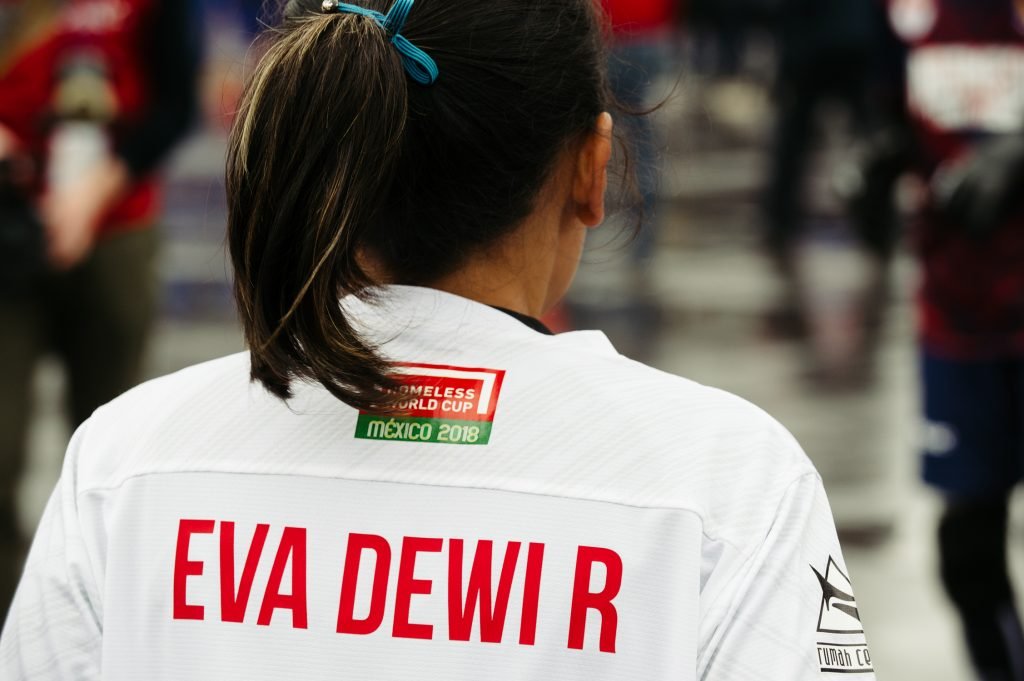“Being a female is not a barrier”
|Image: Daniel Lipinski
“Don’t be afraid. If you have something you want to do, just do it. Oh, and being a female is not a barrier.”
“This time zone makes me confused about when I should be taking my medicine. By the way, I am HIV positive.” Eva gives me a beautiful smile, a big thumbs up and, as if I am the one who needs comforting, says: “It’s okay!”
Needless to say I am already in awe of this woman. Eva is the first and only female footballer to be part of a mixed team representing Indonesia at the 2018 Homeless World Cup in Mexico City.
Eva, alongside seven other team mates, has been supported to come here by Rumah Cemara, an organisation that provides treatment and care for people who have a history of drug abuse and homelessness, and who are HIV positive.
The UN agency for HIV–AIDS prevention estimated in 2016 that 620,000 people have HIV in Indonesia alone. HIV, or human immunodeficiency virus, attacks the body’s immune system, specifically the cells that help the immune system fight off infections. Although the human body can’t completely rid itself of HIV (even with treatment), by taking antiretroviral medication every day the life of someone infected by HIV can be prolonged immensely.
Eva tells me about her football journey to a four-pitch site in the heart of Mexico City hosting more than 450 footballers from 56 countries: “I am a former drug user. I also like to fight—just trying to have fun all the time, I don’t like people trying to rule how I live my life. I always want to be and do whatever I want.”
“I only ever watched football when I was little, never played it … I first started playing soccer in 2013. That year was the selection for the Homeless World Cup in Poznan. I was selected for the female team, but unfortunately we were not able to go—only the men’s team were able to. I can’t believe that I have been selected to represent Indonesia for the Homeless World Cup this year because during the trials I thought I am already too old, because I am 34, and there were only two women.”
Although she is extremely proud to be here in Mexico City, she explains how for her football “isn’t about being a champion, because for me football is how I became a better person for myself and my family—playing soccer is for my health and well-being. I play up front and I love how fast the game is, so you have to think quick and react quick.”
|Image: Daniel Lipinski
Alongside being an athlete, Eva coaches a mixed men’s and women’s team of 16-year-old street children in West Jaffa. Eva is also the proud mother of three children. Having achieved her goal of representing Indonesia at the Homeless World Cup, Eva goes on to say how her “dream for the future is being a good mother—not forbidding my kids from doing anything, just like me …”
With her commitment to coaching football to marginalised young people and with two of her daughters already playing football having seen their mother play, Eva’s seems set on creating a future generation of female footballers from Indonesia.
Conscious that she quite rightly needs to prepare for her first match of the tournament, I impulsively ask one last question about what the emblem is that adorns Eva’s football shirt. I learn that the mythical eagle-like bird is called Garuda, a national coat of arms for Indonesia symbolising the virtue of knowledge, power, bravery, loyalty, and discipline.
I can’t help but think how my brief but inspiring encounter with this female footballer encapsulates all these virtues. On a final note Eva gives me these incredible final words: “Don’t be afraid. If you have something you want to do, just do it. Oh, and being a female is not a barrier.”
Words: Deborah May
Images: Daniel Lipinski


